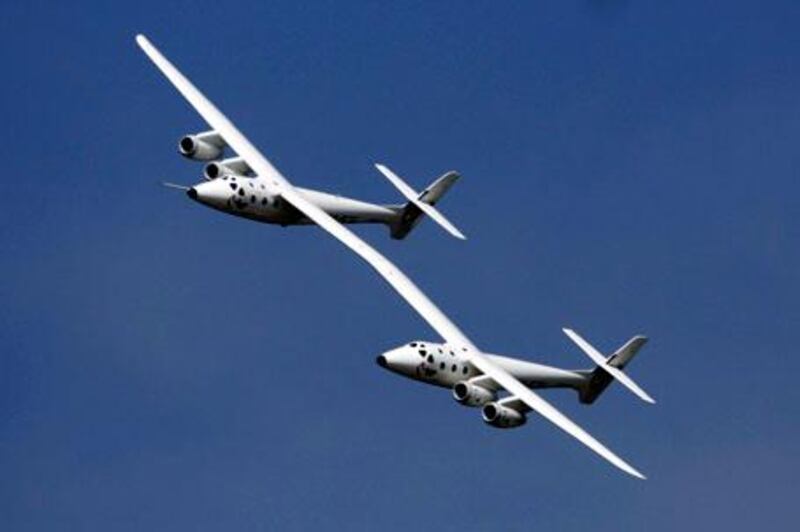LOS ANGELES // For the past half century, ever since the space race between the United States and the Soviet Union hit its Cold War peak, Nasa has been a byword for rockets, launchers and other hi-tech gadgets sending humankind to the Moon and beyond. That era may now be coming to an end. The US government space agency is about to get out of rocketry altogether - at least according to the latest plans laid out by the Obama administration - and hand off the business of building and launching spaceships entirely to the private sector.
According to the White House's latest budget proposals - which still require approval by Congress - existing plans to have Nasa build a new rocket and send astronauts back to the Moon by 2020, the so-called Constellation programme, would be scrapped. Since the space shuttle programme is set to end this year, once the last few missions to the International Space Station have been completed, that would mean no more rockets of any kind.
Nasa would then be free to focus on smaller scale but arguably more cutting edge technologies - everything from developing new space propulsion systems and new, more flexible space suits to creating the computer technology to allow earthbound space nuts to experience the great yonder through their home computer screens. At the same time, Barack Obama's budget would sink US$6 billion (Dh22.02bn) over the next five years into private-sector efforts to build a new generation of spacecraft which would probably not travel as far as the Moon or Mars, but rather take over the space shuttle's commuter duties and also fly space tourists just beyond the Earth's atmosphere for the thrill of experiencing weightlessness and an unbeatable view of the planet.
"The president has asked Nasa to partner with the aerospace industry in a fundamentally new way," the space agency's administrator, Charles Bolden, said as he made the new budget announcement earlier this week, "making commercially provided services the primary mode of astronaut transportation to the International Space Station". The plan has already sparked outrage from old-guard Nasa veterans and a predictable line-up of big defence contractors, along with their political champions, who stand to lose billions of dollars in contracts as their work passes to a smaller, younger new generation of space engineers and entrepreneurs.
Some members of Congress, like Florida Senator Bill Nelson whose state employs 7,000 people on the space shuttle programme alone, have vowed to fight the proposal tooth and nail. The change, though, has been in the works for some time. Space engineers are almost unanimous in declaring the space shuttle a dangerously outdated piece of technology - not least because of the twin disasters in 1986 and 2003 that consumed two crews and hundreds of millions of dollars worth of equipment and accumulated scientific savvy. A panel of experts assembled by Mr Obama cast doubt, meanwhile, that the Constellation programme could really send astronauts back to the Moon by 2020 - suggesting the whole programme risked turning into a giant boondoggle.
Nasa, meanwhile, has been co-operating with the private sector for some time, including this week when it handed out an initial $50m in grants to five private companies planning to develop a space taxi service. The new space entrepreneurs include everyone from big companies such as Boeing to tech and internet pioneers like the founders of Google and Amazon.com. Sir Richard Branson's Virgin empire has a space division, Virgin Galactic, that recently unveiled its prototype for a space tourism vehicle. A company in Las Vegas called Bigelow Aerospace has been dreaming for years of building a space hotel - something that Nasa may now be offering an active hand to bring to reality.
This new private sector - often known as the "new space movement" - has responded enthusiastically to the Obama administration plan. "The president's plan for commercial competition will ultimately take us much farther and much faster, not only to the Moon, but to Mars, the asteroids and beyond," said Peter Diamandis, who chairs the X Prize Foundation, which helps to foster innovation through grants.
"Private companies will drive a very high level of safety because they will cease to exist if they do not. America's capitalist engine drives reliability in our aircraft, our cars, our computers and will do so in space, as well." The change also reflects a changing popular culture. The generation that identified with Neil Armstrong's "one giant leap for mankind" as he landed on the Moon in 1969 has been superseded by a new throng of tech geeks who not only want to travel on space taxis but want to engage interactively with space from home.
Nasa knows this. In fact, it regularly commissions marketing surveys of public opinion and has been discovering that most people - especially young adults - are utterly indifferent to the idea of a Nasa mission to return to the moon. In fact, a shocking percentage of young people believe the widespread conspiracy theory that the original Moon landings were faked in a movie studio. "If Nasa isn't putting all of its money into building new rockets, then it can do much more robotic space exploration, which is what a lot of the space enthusiasts really love," said Constance Penley, a professor of media studies at the University of California in Santa Barbara, who has been studying the intersection of space and popular culture for years.
"So much of Nasa's identity - and I think they have believed this themselves for too long - has been about launching rockets," she added. "But there are many things that Nasa can do that are not just about space exploration - everything from SETI [the search for extraterrestrial life] and the [unmanned] Mars Rovers. If they are not spending money on expensive rockets, that will free them up to do a lot of other things."
* The National






